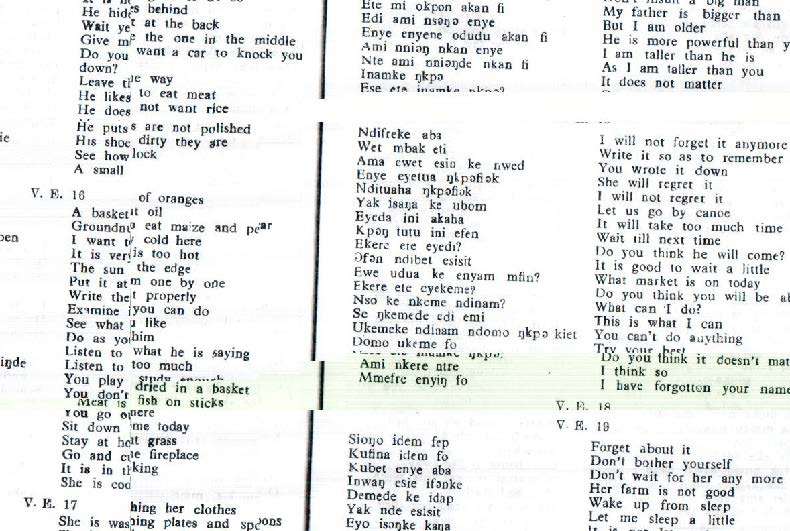letter from the editor
 Scanned facsimile of Rev. F.X. Una, Efik Language (Uyo: Modern Business Press, n.d.), 46–47. Courtesy Unyimeabasi Udoh.
Scanned facsimile of Rev. F.X. Una, Efik Language (Uyo: Modern Business Press, n.d.), 46–47. Courtesy Unyimeabasi Udoh.
Do you believe in ghosts? I do. I think those who don’t would come around if our language better accommodated the concept—if there were a clearer way to say that ghosts are the pieces of a person left behind in the air and in objects and with other people after the person has died, no big deal.1
Friend and poet Ree Sherwood2 told me about an episode of a ghost-hunter show where the ghost-hunters are hunting in a ballroom with a quartz (or maybe limestone) floor. This stone—whatever it was—holds tightly onto sounds, and can spit them out again hundreds of years later. The ghost-hunters consequently believed there were no ghosts, but they neglected to consider that echoes are ghosts too.
If language could better explain it, we would understand that millions of ghosts circle us. Words are ghosts too.3 Writing is difficult because even one sentence is infinite ghosts. Try to string a few together and already you’ll have too many restless spirits on your hands to move. Sometimes writer and reader share a few ghosts, moretimes each brings their own crowd, further complicating even the simplest page.
How does language operate with, in, around these ghosts? What cipher might unlock their codes, let alone our own? This second issue of Plates is a late lunch (what a year to be alive, amirite—we’re gonna skip dinner and go straight to bed, try to sleep it off) served in seven courses that unravel the past, present, and future ghosts underlying a range of personal and political fields.
Thank you for sharing another meal with us. Feel free to send your compliments to the chefs via donation, offering thoughtful adjectives, and/or joining us on Instagram and Facebook.
Let’s eat, grandma,
Casey Carsel
1 But better than that.
2
And past contributor to Plates. See Ree Sherwood, “Respect for Hands,” Plates Issue 01: School’s Out, Breakfast 2020.
3 George Edgin Pugh once said that his father, physicist Emerson M. Pugh, once said that if the human brain were so simple that we could understand it, we would be so simple that we couldn't.
